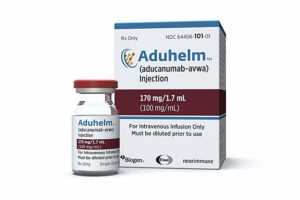By Peg Lopata, Contributing Writer

Photo/submitted
REGION – Aging can bring lots of joy-filled changes: retirement, grandchildren, time to travel. But it can also be a time of unwelcome bodily challenges — many of which modern medicine has the answers for. Bad knees? Fix with knee replacements. Cataracts? Remove them. High blood pressure? Take a pill.
But what about Alzheimer’s disease? This dreaded condition afflicts about six million Americans and has no fix. But a new drug, Aduhelm, recently approved by the Food and Drug Administration, (FDA) though not a cure, may help slow the progression of this disease that destroys the brain. The medicine is promising for those in the early stages of this disease with mild memory or thinking problems — that’s some 1.5 million people.
A medicine makes history
Aduhelm was created by two pharmaceutical companies: Biogen Inc., in Cambridge, Massachusetts and Eisai Co, Ltd., of Tokyo, Japan. It’s the first approved treatment to slow the progression of the disease for those in the early stages of Alzheimer’s. It doesn’t address symptoms–it works to rid the brain of what causes the symptoms.
According to Jim Wessler, CEO of the Alzheimer’s Association Massachusetts/New Hampshire chapter, “This is the first treatment approved for Alzheimer’s disease since 2003 and the first to address the underlying biology of Alzheimer’s disease.”
He was pleased when he first heard that Aduhelm received FDA approval.
The controversy
But that wasn’t the case with everyone. Some scientists say there’s not enough evidence that proves Aduhelm works. In fact, three experts resigned from an FDA independent advisory committee over the approval. Other experts counter by saying not only is it effective, its approval will lead to more scientific research that will perhaps advance even better treatments.
Wessler concurs. “History has shown us that approvals of the first drug in a new category will invigorate the field, increase investments in new treatments, and generate greater innovation,” he said. “For example, there were questions surrounding the effectiveness of the first treatment for HIV. But AZT’s approval stimulated the development of additional treatments and combination therapies that have resulted in a nearly two-thirds decline in the number of HIV deaths since 2000.”
The high cost

Photo courtesy of Biogen
Though the Alzheimer’s Association believes the FDA was right to grant approval for Aduhelm, they and many others have voiced strong disapproval for the price of this medicine. The annual cost at list price would exceed $60,000 for the average patient. Some say it could even bankrupt Medicare.
“This price complicates and jeopardizes sustainable access to this treatment, and may further deepen issues of health equity,” said Wessler. “We call on Biogen to change this price. We are also working with Center for Medicare and Medicaid Services and with the private payer community to remove barriers to coverage for those who would benefit from this treatment.”
How your brain functions
To understand how Aduhelm works, here’s a basic explanation of brain science. Your brain has about 100 billion nerve cells connected like branches–like a neuron forest. Alzheimer’s disrupts the signals that travel in this forest–signals that carry your memories, thoughts and feelings. The result is a brain that loses nearly all its functions.
One theory is that the disruption is caused by plaques–protein fragments that build up in the brain. But what if these plaques could be reduced or eliminated? What could that mean for those with Alzheimer’s in the early stages? Since on average a person with Alzheimer’s lives four to eight years after diagnosis but can live far longer—even twenty years, that could mean a lot.
Early stage sufferers are hopeful
Wessler sums it up. “This approval could mean more time for individuals to actively participate in daily life, have sustained independence and hold on to memories longer.”
If Aduhelm can get rid of brain-cell killing plaques for people who are in the early stages of Alzheimer’s, that’s 1.5 million people who have good reason to seek out more information to see if Aduhelm will help them.
“We’ve heard from many people who are in these early stages,” Wessler explained. “They are very pleased that now there is a therapy that may make a difference.”
Learn more about Aduhelm and Alzheimer’s: www.alz.org or the Alzheimer’s Association help line, available 24 hour a day, seven days a week, at 800-272-3900.
RELATED CONTENT:
Hearing loss intervention can be life changing for older adults (fiftyplusadvocate.com)
Massachusetts surgeon pioneers multidisciplinary breast cancer clinics (fiftyplusadvocate.com)
My Life My Story program adds life stories to veteran’s medical records (fiftyplusadvocate.com)












